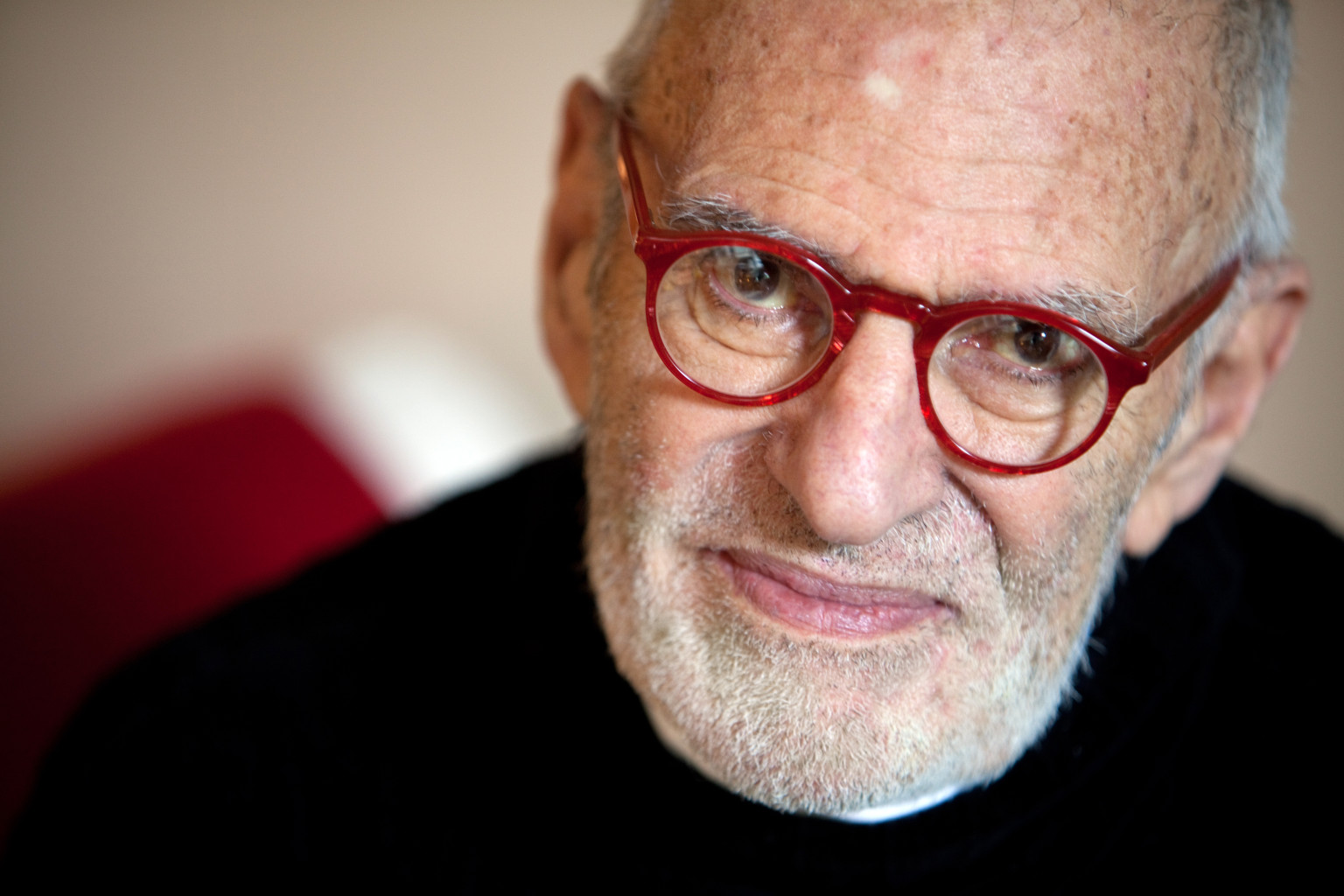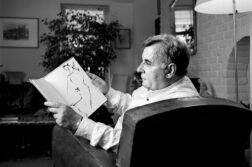REMEMBER THE OLD DAYS when gay writers were squeamish about being “pigeonholed” as such? Yes, I’m a writer who happens to be gay, but… The movie Green Book shows what it was like in the Jim Crow South for anyone trying to navigate the racial divide. In the literary and film worlds that the late Larry Kramer (1935–2020) tried to break into, there were comparable rules of engagement. There’s a scene in Faggots where Rust Legend, a caricature based on the successful, closeted gay film producer Ross Hunter, spells out the realities for gay people in Hollywood. Yes, that character and scene are over the top. But as time would always tell for Larry and his writing, not by much.
Larry did wage an early battle as a gay writer over his script for Women in Love, with its nude wrestling scene. The 1969 film looked at closeted homosexuality at a time of burgeoning gay liberation. Its homoerotic sequence between Oliver Reed and Alan Bates quickly became a landmark of gay consciousness in cinema. With the publication of Faggots in 1978, Larry Kramer became a proudly, defiantly gay writer, but paradoxically through a sweepingly satirical indictment of early gay liberation. In its palpable anger, it landed better initially with mainstream critics of the gay community than with gay activists.
There’s much to observe about the writing life of this great figure of our literature and our times. But even more important than being an openly gay writer was how important writing itself always was to Larry. This won’t strain credibility for anyone who’s aware of the sheer volume of his writing—4,000 pages for what became the 1,800 pages of his two-volume magnum opus The American People. The last e-mail I received from Larry, weeks before his death at 84, said something he’d written before: “If I couldn’t write, I would die.” Writing was Larry Kramer’s lifeblood and was as natural and essential to him as breathing. He heroically fought many battles for his own health and kept winning them against the odds. How did he do it? By continuing to write. That was his secret.
 Was Larry addicted to writing? His views about sexual compulsivity and addiction could seem like those of Nancy Reagan (“Just say no”). But he did wonder about his own relationship to writing in this context. In an email exchange in 2012 in which he was scolding me for having gained weight, he observed: “Yes it’s hard for people to change. So what. It’s hard to do a lot of things, like write a book or take care of a big patient load. You do it because you feel a need for that. If anything I am addicted to writing. I feel very uncomfortable when I’m not at my computer. I hate days off and vacations, but it wasn’t always that way.”
Was Larry addicted to writing? His views about sexual compulsivity and addiction could seem like those of Nancy Reagan (“Just say no”). But he did wonder about his own relationship to writing in this context. In an email exchange in 2012 in which he was scolding me for having gained weight, he observed: “Yes it’s hard for people to change. So what. It’s hard to do a lot of things, like write a book or take care of a big patient load. You do it because you feel a need for that. If anything I am addicted to writing. I feel very uncomfortable when I’m not at my computer. I hate days off and vacations, but it wasn’t always that way.”
However habituated he may have become to writing, Larry appreciated his freedom to do so. His brother Arthur was a successful attorney who took the windfall from Larry’s screenplay for the disastrous Hollywood film Lost Horizon (1973) and invested it so successfully that Larry was able to devote himself full-time to his writing and activism for the rest of his life.
As a writer, Larry was my mentor. He was the first to help me appreciate that I had my own voice, my own things to say, my own way of saying them, and not to be discouraged by challenges. He was a good friend during my coming out years and early life in New York, and he became my role model for writing, especially in his seriousness about writing and his courage to tell the truth, however personal, angry, and against the grain of popular opinion.
Meanwhile, I envied his freedom to write. In those years I had a lot of pity for myself as a writer who had to work, even though it was in medicine, which was fascinating and important to me. I remember feeling resentful when Larry’s response to my pouring out my heart to him was tough love: think positively, kid; you gotta pick yourself up by your bootstraps and do whatever it takes to make it all work.
Thanks in no small measure to Larry’s example and encouragement, that’s what I ended up doing, albeit after a nervous breakdown, dramatized in The Normal Heart as something very different from what I perceived myself as having lived through. For Larry Kramer’s Mickey Marcus, my hospitalization for a major depressive episode was about Mickey’s not knowing what to tell people about the emerging AIDS epidemic. As I saw it and felt it at that time, however, my downward spiral was overwhelmingly about how hard it seemed to make my life’s work as both a writer and wage earner, a mindset of self-pity that wasn’t helped by incipient alcoholism. None of this is in the play.
When I emerged from that dark moment, my realities were still there. If writing were really that important to me, I was going to have to find a way to do it while simultaneously earning a living. Drinking had rendered this turning point tougher than it needed to be. In fact, there have been a number of doctors who were writers—Chekov, William Carlos Williams, Jonathan Miller, to name a few, as Larry was quick to remind me. My details may have been different from theirs and I may not have had their talent and success, but there was no reason why I couldn’t find my own path forward, as Larry had always believed.
With Larry as my role model and inspiration, and as well a subject, I went on to write a memoir, Confessions of a Jewish Wagnerite, in which the character based on Larry is named “D.J. Love,” and to edit a collection, We Must Love One Another or Die: The Life and Legacies of Larry Kramer. In the fifty years of our friendship, despite many periods of falling out, often lasting years, our bond endured. With Larry’s help and in recovery, I was able to see that I could do it all. I still get up at 4 a.m., and my writing still feels as life-sustaining as to any other writer, but I do it now with greater equipoise.
“If I couldn’t write, I would die,” may always be a rallying call for writers, gay and otherwise. But making responsible choices doesn’t always have to be at life-and-death odds with the imperative of writing. That’s what I learned from my life as a writer and physician, and from my friendship and apprenticeship with one of writing’s mightiest and proudest exemplars, Larry Kramer.
Lawrence D. Mass, MD, a specialist in addiction medicine, is the author of We Must Love One Another or Die: The Life and Legacies of Larry Kramer and Confessions of a Jewish Wagnerite: Being Gay and Jewish in America. He lives in New York with his life partner Arnie Kantrowitz.



